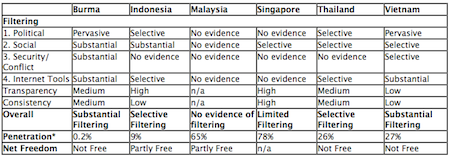Cyber political pundits, bloggers and Facebook activists in Thailand often feel deeply frustrated and annoyed with their lack of liberty to write at will. Yet netizen's frustration with seemingly increasing internet censorship is not unique to Thailand, but rather it's part of the global insurgence of state control over internet freedom. As the internet and new media come to dominate the flow of news and information around the world, governments have stricken back with measures to control, regulate and censor the content of blogs, websites and text messages. A new study by OpenNet Initiative, a renowned research group that studies internet surveillance and filtering based in the University of Toronto conducted testing on the degree of filtering and transparency on several Southeast Asian countries. The results reveal some common trend.
While the growth of internet usage across the region (except Burma) has caused some worry among political leaders, reasons for such concern vary. Indonesia and Thailand focus their internet censorship efforts on social issues, particularly online pornography, whereas Malaysia, Vietnam, Burma and to some extent Thailand have gone to some lengths to crack down on cyber dissidents deemed a threat to regime stability. The varying degree of filtering on issues of social, political, and national security importance give some indication of the country's priority on internet control.
Some leaders are more paranoid about the threat of internet than others, however. The Burmese government has taken measures to restrict internet freedom that are incommensurate with the extent of the problem. Not only that less than 1% of Burmese has access to the internet, but the internet curfew that permits users to go online only between 9pm to 5am place greater disincentives for net users. Cyber attacks on opposition groups are common place and harsh penalties await violators.
Other leaders, while wary of potential negative impacts of the internet on political stability, have opted to allow for greater internet freedom. Singapore, with its hegemonic party rule, has one of the world's highest internet penetration rates. Instead of practicing cyber surveillance and filtering, its leaders prefer to rely on non-technological means to curb online commentary perceived to be a threat to social values and religious and ethnic harmony. These “second generation” control mechanisms, such as lawsuits, steep fines, and criminal prosecution, act to deter “inappropriate” online behavior.
Thailand, in comparison to its neighbors, has a rather “schizophrenic” practice of internet censorship. The Thai state began cyber surveillance in 2002 on issues of pornography, separatists, gambling, terrorism and negative comments regarding the monarchy, but in recent years much efforts concentrated on the latter. The study finds that filtering is not performed consistently among internet providers, with state-run TOT exercising greater surveillance than its private counterpart, True.
Indeed the country lacks explicit privacy law and its censorship regulations remain opaque – giving undue power to the state to execute cyber dissidents at will. Yet despite this climate of pervasive fear and self censorship among Thai netizens, a growing number of them have with some success resisted control via the use of various circumvention tools.
The future of global internet freedom looks bleak despite the growth of net users. Southeast Asia is likely to be no exception. Governments, poor and rich, have grown increasingly savvy with cyber control, employing more and more sophisticated tools to censor the internet in the name of “national security”. Private companies respond with more innovation on cyber security as opposed to developing new ways to promote cyber networking and surveillance circumvention tools.
Source: Adapted from Access Contested (2011), with the exception of Singapore whose results come from their 2007 study. The Net Freedom column is based on Freedom House Net Freedom 2011 ratings.* Penetration rate is based on ITU 2009, 2010




